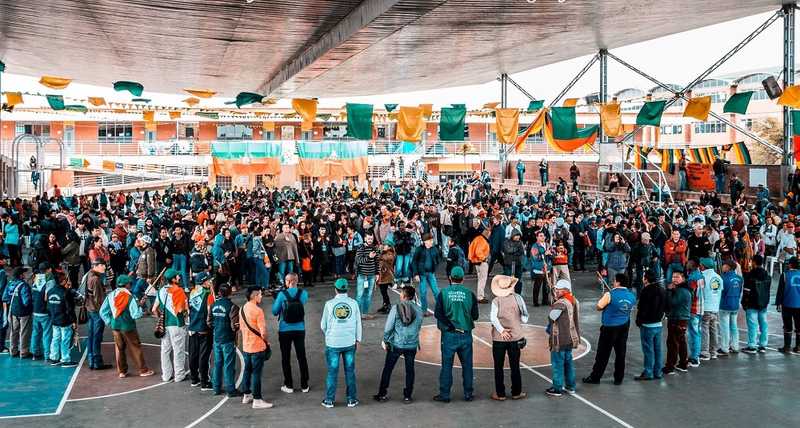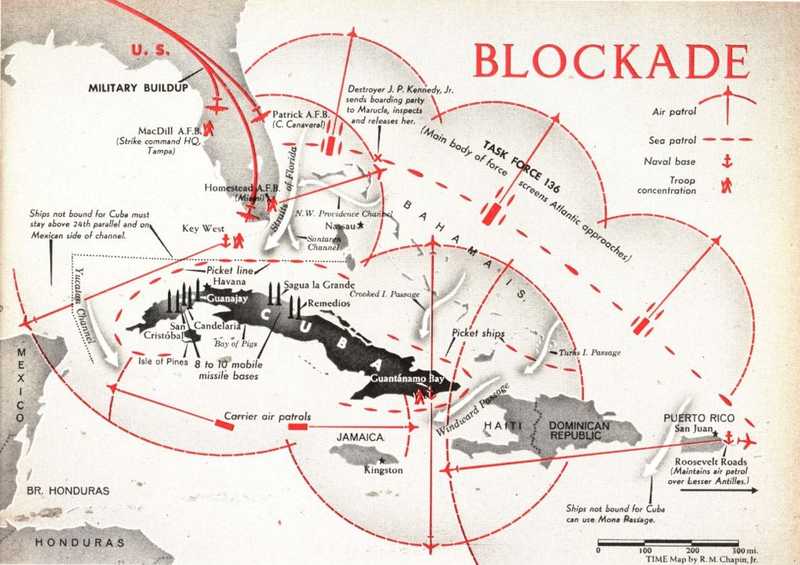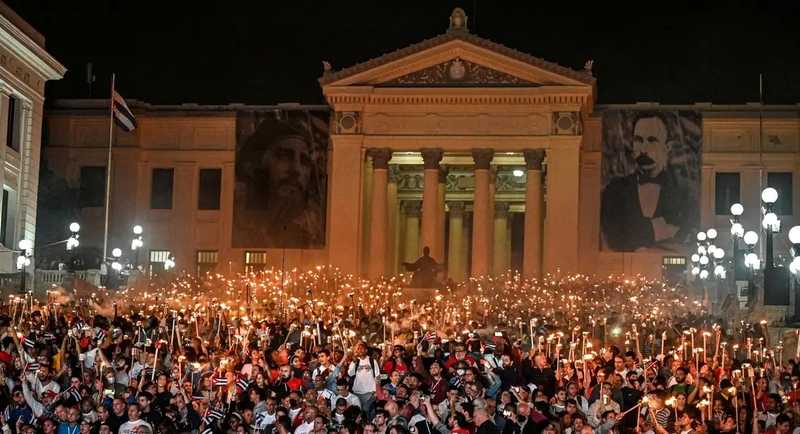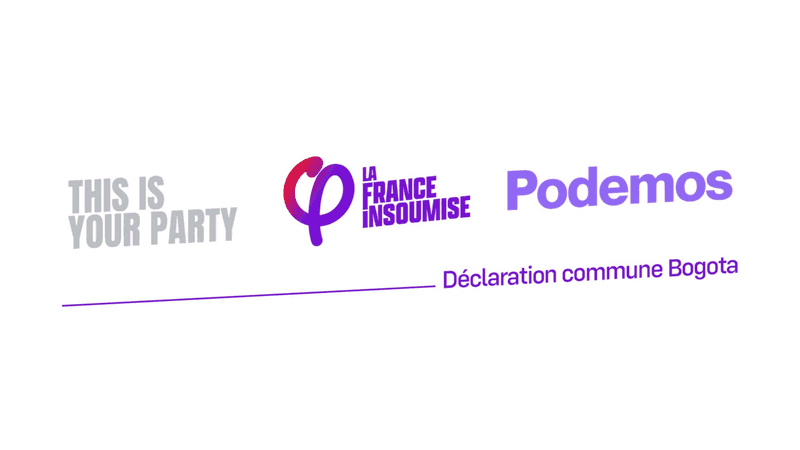
It is with joy that we join the peoples of the world to sow a different future, as one more to build and strengthen the structures in our corner of the world that we hope will become the seeds of new dawns.
Colombia is full of popular processes, with different degrees of legal or de facto territorial autonomy. History allows us to understand that colonization was not a one-off event but is still ongoing; we are still actively resisting in the territories. Populating Colombia did not occur in just a few years, but over the last 500 years. Over the centuries, "settlers" arrived in "new territories". In some cases, they coexisted harmoniously with the ancestral indigenous or Palenquero peoples, although this was constituted over long centuries of rebellion, as Afro-Colombians struggled against slavery. Colonization was carried further and further out in waves, until recently when expansion reversed to fill megacities, as people searched for a better life or sought to escape war.
The absence of the State is our starting point, where, in some territories of Colombia, the only known presence of the State is the arrival of its helicopters and military troops. This is how some communities have always organized themselves, resolving the issues of access to water and food, and providing their own structures of self-government, such as traditional authorities, assemblies or other forms of expression. In essence, we had a multitude of societies and peoples, followed by the arrival of a centralized state in the capital city of Bogota. The State’s principal form through which it relates to the rest of what it considers its national territory is war, that is, a war against the peoples’ autonomy.
This is where most of Colombia’s armed insurgencies arise from: the lack of possibility to participate, to be heard, and to exist. These peoples have armed themselves for several reasons. Some just to defend themselves, others to take power and others in the hope to create it. For decades, the Colombian oligarchy has maintained war as its only language without hesitation, arming poor people to go to war with the rest of the population. This bleak situation remains unchanged, with unfulfilled peace agreements and suspension of dialogue as the result. This is in violation of every international treaty and leaves the territories and their dreams of autonomy immersed in political, social, and armed conflict.
Nonetheless, many organizational processes that recreate community strength are born from these historical developments. 2008 was a turning point as, in the midst of war and with a paramilitary government in power, the indigenous peoples of Cauca said, “Enough. We are going on a Minga under the slogan: ‘We prefer to die standing up than kneeling down.’” All these organized communities and their expressions proclaimed in unison, “Here we are. This is our territory, and we are going to fight for it.”
The inspiring determination of indigenous communities, who understood the need to articulate their demands at the national level, was the catalyst for the Peoples’ Congress in 2010. The Congress has convened three times, with 15 to 20 thousand people organized through delegation. What we call Popular Power is created daily through the actions of peasant organizations, traditional Black or Indigenous governments, and organized regional movements.
The Peoples’ Congress hosts enormous sessions as it brings together black and Indigenous peoples, peasant communities, women's and trade union organizations, political parties, political prisoners, LGBTI groups, research centers, and activists. All of them propose building popular mandates and seek to become Colombia’s sovereign Congress.
The mandate is not a demand; it is a law of our own that we give ourselves. So, when we mandate food sovereignty, we have a duty to keep our word and transition to organic agriculture wherever the agro-industry has devastated ecosystems. We must preserve seeds and keep territories free of harmful chemicals and GMOs. We have a duty to keep our word and organize the transportation of food, open stores in the cities, and build our own economy. These efforts imply that, along the way, we will have to stand up to the State. In 2013, 2014, 2016 and 2018, a host of social and political demonstrations were carried out in the streets. By engaging in civil disobedience, we open spaces for Black, indigenous, and peasant authorities to negotiate with the State.
Building popular power implies defending the territory and social structures. Historically, people’s defense is carried out by the Indigenous and Maroon guards. But today, peasant and urban guard movements join the task. Primeras lineas (‘front lines’, as these protestors are called) have become famous in recent mobilizations throughout Latin America. These people’s defense groups are armed with a simple stick, ’the baton of command’, which represents the collective authority entrusted to each member of the community. It is a reminder that we must comply with the mandates that we give ourselves.
The Peoples' legislation covers all domains, therefore we have drafted a series of mandates:
- LAND, TERRITORY, AND SOVEREIGNTY. To give an account of the territorial and regional collaboration that, as communities, we carry out every day. Autonomy and self-determination is our aim.
- AN ECONOMY THAT IS FOR LIFE AND AGAINST PLUNDER. To continue confronting a production model in which plunder and inequality have been the norm.
- BUILDING POWER FOR GOOD LIVING (“Buen Vivir”). Politics and power dynamics are understood as both a process and a means for the release of all potentialities in recovering the integrity and harmony in social life and natural life.
- CULTURE, DIVERSITY, AND THE ETHIC OF THE COMMONS. To account for the myriad ways through which we build life together. Colombia is a pluralistic society.
- LIFE, JUSTICE, AND PATHS TO PEACE. Building a country that is meant for everyone is an impossible task if peace and justice are not serious commitments. The essence of the conflict is the imbalance in nature and society which the dominant order has produced. For this reason, our framework for overcoming these struggles is neither circumstantial nor partial, but encompasses the character of life itself and its functional relationality.
- VIOLATION OF RIGHTS AND UNFULFILLED AGREEMENTS. In all these centuries of struggle, the agreements we have made with governments have been betrayed, distorted, broken, and disrespected. So, too, have our rights been systematically violated and disregarded. Like muscle memory, knowing our history strengthens and grounds our struggle.
- CONNECTING THE PEOPLES AND GLOBALIZING THE RESISTANCE. Our struggle stretches far beyond Colombia. Throughout Latin America and the entire world, people have been creating alternative social models and even international relations which correspond to our own interests. Our challenge now is to articulate and promote them together.
The above is what working on popular mandates as a Congress looks like. It implies orienting our notion of Colombia by putting communities first and creating popular power.
The Peoples’ Congress has, from its inception, understood that a dignified life is only attainable within the framework of the internationalist struggle and global systemic change. The pandemic, which cruelly reveals the critical condition that our world is in, makes the need for unity in our democratic processes more urgent than ever. We must create a Peoples’ movement with the capacity to rise up, dispute, propose, and replace our current political-economic system for one founded on an ethic of the commons.
Our critiques cannot be limited to analyzing neoliberalism and the dismantling of public services. Of course, we must fight for health, education, and all public services. But, if we do not go to the root of our problem, we may deceive ourselves in thinking that to dismantle neoliberalism, we must strengthen the State. Remember: the State will never be at the service of the People. The presence of popular movements in government is essential to the contest for power. Although popular power can be encouraged by the government, it is created by the people and done so outside of the State. Examples of public services existing outside of the State include cooperatives, aqueducts, health centers, and community colleges. We have to build much more but we must also recognize what we have already accomplished.
Today we share with you some of our experiences with popular power through the Peoples’ Congress. This is but one of many stories of popular struggle in Colombia, this fertile land where many rebellious peoples have their roots.
We share our story with you in the hopes of joining together, getting to know each other, and recognizing ourselves as one in the creation of a Peoples’ movement that will allow us to act decisively and change the course of the world.




